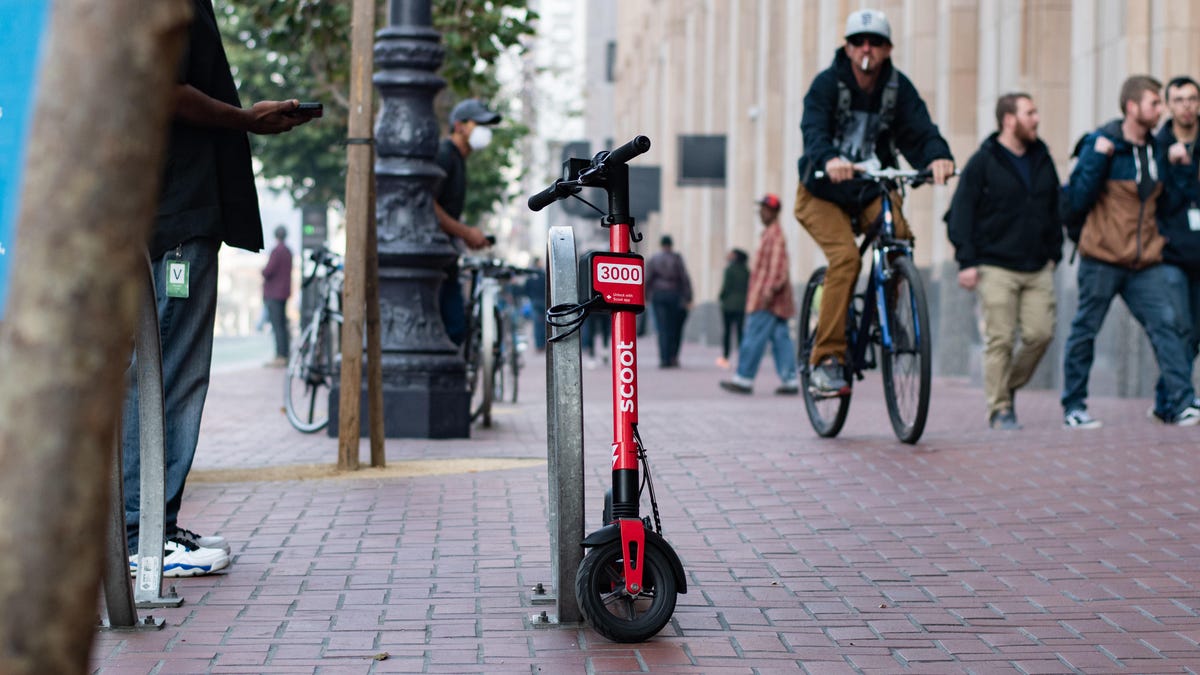Electric scooter fleets to double in San Francisco
The city will allow the vehicles to multiply, as long as they can be locked up.

As of February, all of Scoot's scooters in San Francisco come with a lock.
San Francisco is allowing the number of electric scooters in the city to double from 1,250 to 2,500, the San Francisco Municipal Transportation Agency said Monday.
To expand their fleets, scooter companies will first have to comply with several requirements, including increasing equitable access with more low-income riders and making sure all scooters have a lock.
It's been six months since San Francisco launched its yearlong pilot program for electric scooters. After studying vehicle usage, the city has concluded that locks greatly reduced sidewalk clutter -- residents' No. 1 complaint about the vehicles.
"Last spring we were getting over 1,000 complaints a month," said Tom Maguire, sustainable streets director for the SFMTA. "As of this February, we were getting fewer than 100 complaints per month."
More than 100 cities across the US now have these dockless, rentable electric scooters, but San Francisco was one of the first cities to get them. In March 2018, three companies -- Bird, Lime and Spin -- unleashed roughly 2,000 electric scooters onto San Francisco's streets, surprising both lawmakers and local residents.
Some people took to the scooters immediately, seeing them as a convenient way to get around the congested city. Others hated them, calling the scooter phenomenon by many names: Scootergeddon, Scooterpocalypse and Scooter Wars. Some expressed their rage by tossing the scooters into trash cans, hanging them from trees and even smearing them with feces.
By April, San Francisco regulators had had enough. The city passed a law to regulate the scooters, limiting the number to 1,250 and requiring companies to get a permit to operate them. Twelve companies applied, including Bird, Lime, Spin, Lyft and Uber's Jump, for five possible permits. But in the end, regulators only gave out permits to two companies that had worked with the city from the beginning -- Skip and Scoot.
Now, both Skip and Scoot can expand their fleets to each have 1,250 scooters. But first, to get 175 extra permitted scooters, all of their vehicles will have to come with a lock and the companies need to add at least 150 more low-income riders. Then, to get 450 more permitted scooters, the companies will need to add more than 500 low-income riders. Currently, less than 1% of Scoot and Skip's riders in San Francisco are low-income.
Both companies said they're planning to comply with the city's new requirements and increase the number of scooters they have on the street.
"We respect the agency's priorities around fleet size and inclusion and we will continue to grow our fleet and our Community Plan membership," said Michael Keating, Scoot's founder.
Skip CEO and co-founder Sanjay Dastoor said, "The consistent usage of our vehicles throughout San Francisco, as well as the positive response from our neighbors in the community, has been encouraging as we work to bring more trips out of the car lane."
The city's yearlong pilot program ends Oct. 15. As that date approaches regulators said they'll decide on a possible ongoing program. They also said they'll allow more scooter companies to apply for permits at that time.
Originally published April 15, 2:23 p.m. PT.
Update, 4:30 p.m.: Adds comments from Scoot founder Michael Keating and Skip CEO Sanjay Dastoor.

